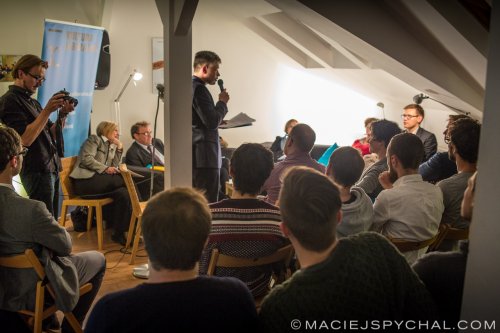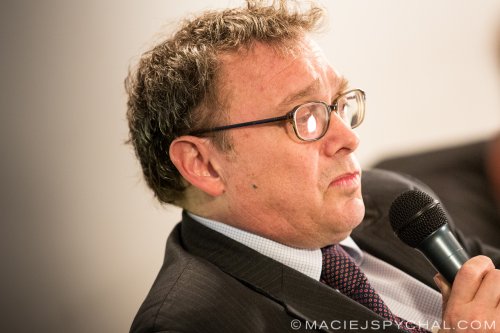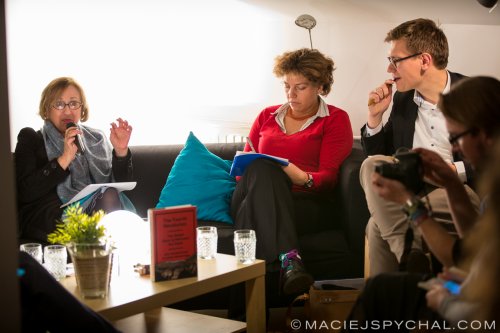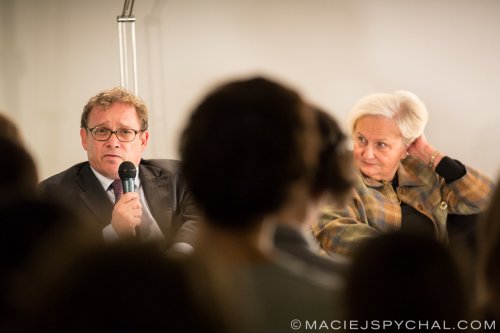Adrian Wooldridge: We wanted to challenge three different ways of thinking about the state in our book. The first is the con- servative-liberal, rightist approach, according to which the state doesn’t matter at all. Supporters of that view would like to limit the state to such a size – just to quote one of the American con- servatives – that it would be possible to flush it in a bath. In my view, people with such views should spend some time in Congo or Somalia – countries without state structures of any kind.
Second of all, we argue with the social democrats and socialists. They claim that the state needs to be protected from dismantling, but they do that in the worst possible way. They think that every function of the state should be automatically defen- ded. These people are not right as well – many states are too big, ill-organized and not adapted to the world of new technologies.
Finally, we wanted to get to the common people, who don’t understand the role of the state and who are completely indiffe- rent to it. We saw that during the European parliament elections for instance, when people voted against the mainstream parties, showing their disapproval of the ruling elites in this way. Such mood, however, is not followed by any constructive project of change. People want to get rid of the state, instead of reforming it. In our book we argue that the fundamental changes experienced by the private sector under the influence of new technologies will reach the public sector as well. We would be very naïve, if we thought differently.
Jarosław Kuisz: Abandoning the division between the left and the right, you criticize most of the reform initiatives that are currently debated. Solutions from ‘The Fourth Revolution’ aim further than the political status quo of to- day. If we are talking about the future, I have to ask: what conclusions about the role of the state could be drawn by the young generation?
Adrian Wooldrige: The state is important and it needs reform, but we have failed in that so far. For the most of the post-war era we thought that democracies make the best governments. But this conviction has been diminishing since the year 2000. Russia abandoned her experiment with democracy, democracy ended in a catastrophe in the Middle East, the European Union doesn’t govern itself democratically and cannot really be a role model. The American democracy is failing as well, the Senate cannot pass the budget regularly. At the same time, we have the Chinese authoritarian model, which is not only very successful economically, but have also developed the mechanism of change of the political elite without any disturbances or collapse of the state’s institutions. The advantage of democracies and liberal governments is in decline in the 21st century, and one of the main reasons for that is their ineffectiveness. We have to limit and modernize our statehood, not only because it’s the best way to ensure its effectiveness, but also because in this way the democratic model will survive the competition from the East.
Łukasz Pawłowski: You point at many challenges facing the modern statehood, including the issue of education, which is widely discussed in Poland. I would like now to ask a question to professor Anna Giza. You represent the governing body of the University of Warsaw, one of the two best universities in Poland. It is a public university, but the universities at the top of the world rankings are usually private. Do you think that the state should resign from financing higher education?
Anna Giza: University is a state in a miniature. For that reason all of the problems and crises that trouble states are also affecting universities – but it is also easier to find the sources of these problems. We should ask a question, not only about what do we want to change, but also what we can afford. Education in Poland will remain public also because it is a rule guaranteed in the con- stitution. Nonetheless, listening to the debates in the West, I start to think that education is really a public good – that is, it should answer the challenges and problems that are important to all of us. However, we have to start from acknowledging that we have never really discussed the goals we set for higher education in Poland. We try to change the law, we introduce many reforms, but we are not sure, what do we want to achieve.
Jarosław Kuisz: I have a feeling that we, in academia, have been asking the same question about the purpose of higher education for many years now. Haven’t we heard all the po- ssible answers, from a virtuous idea of academia to complete subordination to free-market rules? Or maybe we should offer more modest, pragmatic, but achievable goals, instead of discussing grandiloquent ideas of reform?
Anna Giza: I am aware that our community is not really good with formulating some proper goals for higher education. However, I cannot find such goals in documents like ‘The Strategy for the Development of Higher Education in Poland’ either. Do we really need half of our population to have a university degree? What’s the purpose of that? What should a diploma mean, and what means should it serve? We have never seriously answered these questions, we have not even discussed them properly. We shift the responsibility between universities and the government. The government changes the law in order to make us do some- thing – we find a bypass, then they change the law again… that game leads nowhere.
Łukasz Pawłowski: Professor Giza, and how would you an- swer the question about the purpose of higher education?
Anna Giza: The first few levels of education introduce people to the heritage of our civilization, they help to find oneself in it to some extent. Higher education should create a space for development of talents, individual experimenting and creativity, pushing the frontier of knowledge. I believe that we need higher education in order to set new intellectual goals and challenges, to learn how to ask questions and to look for the answers in a responsible way, enthuse others with passions and a joy of discovering.
Łukasz Pawłowski: Would these goals be fulfilled better, if universities were private?
Anna Giza: Both solutions are risky, so it would be the best… if we combine them. We mustn’t expect from private or business sponsors that they will simply give their money for a free intel- lectual development of students. But public funding might be troublesome as well. Public institutions aren’t innovative from their very nature. That’s why some form of a compromise would be the best.
Adrian Wooldridge: Private universities are similar to the public ones, they simply have more money. The problem is a group of conservative academics, which oppose any innovation, and we may find them in both cases. Thanks to the new technologies, universities will change over the next 10 years to such an extent, as they have changed over the last 150 years. Users will be able to pick up from a broad offer of studies conducted remotely.
Ewa Łętowska: Mr Wooldridge presented a vision of democracy in a deep crisis. Then, we have been thinking about what should we do with the higher education. I suggest stepping down even further, because the crisis of a state in Poland has some very characteristic features. We think that the law is made by the parliament or by a minister. That’s not true! The law is created by the bureaucratic oligarchy grouped in the ministries and in the parliament. That law has very low standards in Poland, and for this reason it usually consummates freedom, instead of sup- porting it. Because – against the opinion of some of the liberals– law does not always limit freedom. We have to know which legal tools we should use in a specific case. But we need good officials for that, and their standards were lowered recently.
Łukasz Pawłowski: But the number of bureaucrats has dra- matically increased in the last few years. Is it worse despite that increase?
Ewa Łętowska: Yes, because they tripped over their own feet! They can’t do something well, so they at least do much.
Anna Giza: The law in Poland is used for decreeing some reality, rather than for creating mechanism for achieving specific goals. We decree that we should have, for instance, a universal health care, but we do not create any instruments, which would make that decree possible to function.
Łukasz Pawłowski: A question for Joanna Tyrowicz – you’ve done a lot of research which investigated the effectiveness of various state institutions, and you suggest solutions which would help them work better. But I know you face a barrier from time to time, which cannot be overcome. You present some proofs for the change of policy in some area, but no one treats these proofs seriously. Why is this?
Joanna Tyrowicz: We should notice huge differences between various countries, if we discuss issues like preparing the law or policies. These differences are present in developed countries as well. People in Great Britain can naturally complain about many issues, but the state over there has many advantages, including the fact that it knows what kind of challenges it has to face. It is aware of the problems and checks, whether the implemented solutions actually work. Analysis of the outcomes of some specific policy is rather an exception than a rule in Poland. And this is not only my opinion, but an objective fact.
Jarosław Kuisz: Why the state officials don’t do that?
Joanna Tyrowicz: Because they don’t have to. No one checks on them in this area. This is naturally an answer based on personal experience, not a scientific one.
Jarosław Kuisz: And on a central level of government?
Joanna Tyrowicz: Politics in Poland is simply a game of power – if you are in charge, you’re making the decisions, if you’re not, ‘they’ make the decisions. No ones interested in what the other side has to say.
Adrian Wooldridge: We have achieved some borderline in the development of modern states. The state evolved from a creature responsible for a negligible number or entitlements, to a model of something that provides us with many services that we con- sider being fundamental. Harold Macmillan, the British Prime Minister between 1957-1963 has said during his term that ‘people have never had it so good.’ And that was true. But something went wrong in the 1970s, when the state started to give less and less with limited investments. An economic stagnation started. The reaction to that was an attempt to repair the state and to return to its basic, original functions. That’s what Margaret Thatcher and Ronald Reagan tried to do. But these reforms worked well only for a moment.
We see that the state is growing again, that it’s spreading around new areas, taking too much on its plate. And it fails again. We have to change the way it functions, not only in order to make it work better, but also because of the basic economic facts – we don’t have that much money as we used to have. We struggle with a constant deficit. United States managed to balance its budget five times since 1960, France has not done that once since 1974.
Jarosław Kuisz: We may have an impression that a huge de- ficit is now a permanent element of Western democracies. What’s the reason for that in your opinion?
Adrian Wooldridge: The Keynesian model of economics was supposed to be an answer to the Great Depression, but it became an ordinary, everyday way of handling the economy. We cannot work this way any more, also because of the demographics – the baby boom generation is growing older. An economist Herbert Stein has said once that if something cannot function, it will sim- ply stop functioning at some point. Change of how we manage the state is necessary.
The good news is that we can change that bad management – to some extent by learning from the private sector, which focuses more on the effectiveness of the undertaken actions; to some extent by simply taking into account the results of the research. For instance Poland spends less money per student than California, but your students achieve much better results in international competence tests.
I am very optimistic about the technological revolution, which is happening right now. Its importance for the services sector will be as great as the industrial revolution was for the production in factories. Progress in access to all kinds of informa- tion – music, films, academic lectures, books – is incredible, even in comparison with the year 1999. This technological revolution must reach the public sector. Universities, schools, hospitals – they will all have to introduce changes for the 21st century.
Łukasz Pawłowski: But why would that happen at all? Your book gives a lot of examples, when certain technological solutions from the private sector didn’t work in the public sphere. Like the introduction of IT into public offices. It was supposed to lower costs and increase effectiveness, but computers were used not as tools providing new opportu- nities, but rather as more sophisticated typewriters. All in all, nothing really changed. So why do you think it should be different this time?
Adrian Wooldridge: Someone has said that we overestimate the importance of new technologies in the short-term perspective, but we underestimate it in a long run. When new technologies started to be important for the first time, we were dealing with huge information systems created by the central governments. Today almost each one of us has the most up-to-date computer in his or her pocket. This progress of individuality enforces a state that would be more transparent, that would enable access to any kind of information.
I remember university lectures when I was a student many years ago. The lecturer was standing and reading from notes for an hour. Today, we can listen to the best lectures from all over the world for free on our iPads. These are huge changes. We will be living in a different reality ten years from now. This will be a good time.
Joanna Tyrowicz: I am not sure if wide access to information is the same thing as knowledge. It rarely happens that the really smart people discuss things, that people can – basing on the opinions of professionals they’ve heard – to make their own mind, basing on some rational premises. People tend to agree with someone whom they trust for some reasons, and discussions are usually brought down to the level of a simplistic dichotomy. Anna Giza: I completely agree that we have a problem with opinion that would have some professional value. It’s becoming more and more difficult for an average person to formulate such opinions, and too much information is the reason for that. It’s difficult to pick up the valuable ones. For this reason I think that universities should help not only in gaining knowledge, but also in developing skills of finding the right information, and presenting a well-thought, balanced opinions formulated on that basis. It’s not that simple. Formulating an opinion is a complicated process. We have neglected that side of education in our system and it will continue to be so, if we keep focusing on a system based on tests, and not on a broader, critical thinking and analysis.
Ewa Łętowska: This brave new world, which Mr Wooldridge foresees, and which will be built on the technological progress, requires more thoughts in one critical point. Each reform and each change – no matter whether it is forced by technology or new regulations – must inevitably bring not only positive outcomes, but also negative ones. Always. Example? The office of bailiff was privatized in Poland. That means someone who executes debts. Private bailiffs decided to increase their effectiveness. How do they do that? Instead of looking for the actual debtor, they send debt-execution letters to anyone with the same name as the debtor. This is very effective from their perspective. Very convenient. It means shifting the responsibility onto innocent people, who have to tear out – I emphasize that, to tear out – the acknowledgement of their innocence from that imbroglio. Why? Because no one has thought that privatization of the bailiff’s office might have such results.
Łukasz Pawłowski: So it shouldn’t have been privatized?
Ewa Łętowska: Social trust and trusting the state – which is low in Poland anyways – is declining not because of the new technologies or market-approach in many spheres of public life, but from neglecting the fact that we should remove the negative effects of these transformations. We simply don’t care. Politicians don’t care for obvious reasons. Media are too stupid. Thus, we, the common people, have more difficult lives. If the state gave up its role as a buffer, I would prophesize an Armageddon.
Joanna Tyrowicz: I wouldn’t demonize the issue of the lack of trust. It’s not like that people fully trusted the state in the past, and today they lost the trust completely. When ‘everyone’ trusted the state in the 19th century, no one has examined the government so carefully as we do today. When the universal social pensions system was introduced by Bismarck, or the great reform of public education in the early 20th century Great Britain, they didn’t have that many calculations, analyses questioning the results of these reforms, and these weren’t presented to the public. They didn’t have dozens of more or less professional experts, who would oppose the solutions offered by the government. Today we have more people who look closely at the system. They fol- low the work of the legislators, politicians and say – no, you are wrong. It’s difficult to have ‘everyone’ trusting the state in such a situation. The other thing is, that if one has enough support and feels powerful, one can simply ignore these critical voices, instead of discussing with them.
Jarosław Kuisz: Coming to the end of our discussion, I would like to ask about the responsibilities of the state towards us, the citizens, on the labour market. During the last debate from the ‘Time to Talk’ cycle, we heard serious questions whether – wait for it – ‘everyone should have permanent employment’? After twenty-five years of the Third Republic, we could expect that if the state should offer something to young people, it should be ‘permanent employment’ for everyone. Can we have such great expectations of a state which transforms so radically, so quickly?
Joanna Tyrowicz: Do we mean a job for everyone, or a full-time contract?
Jarosław Kuisz: Full-time contract, naturally.
Joanna Tyrowicz: Then we have a problem. One of the issues, which needs to be taken into consideration – and lawyers point to that as well – is the definition of a ‘full-time contract.’ The Polish Labour Code is based on a vision of the employer as an independent individual, who is free, within the limits established by the Code, to formulate the contract he or she signs with an employee. That could be true in the 80s, but today, a number of employers, for instance those with a foreign capital, do not have people in charge in our country, but the decisions are made by the people residing abroad. If such people are based outside Poland and make there all the decisions about the company, how can we talk about the employer-employee relations understood in traditional terms?
Let’s imagine someone that lives in Poland, but works for a foreign firm that makes furniture. He is hired through an agent, as that firm has no offices in Poland. His work is about being an agent between factories and clients in the CEE region, from Romania to Estonia. He provides furniture for everyone who could be interested all over the world. Let’s say he secures a contract from a German firm to furnish their office in Romania. We face a serious question now – who is actually the employer, the client, who assesses the effectiveness of such a worker, and who decides on the form of his contract? Even though there are some legal requirements, decision-making processes might in fact run somewhere else to what is being written down on paper.
Jarosław Kuisz: Does this mean that from some level – which we should wish to all the young people – there are no strict rules of employment? At least on the level of one country?
Joanna Tyrowicz: If we agree now that we want everyone to have a full-time contract, then we would have to ask a question about the nature of that contract, what we would like it to be, and what will it be in 10-25 years time. We should look into the long-time perspective, and not backwards, basing on the experience of the previous decades. Meanwhile, a lot of discussion about the so-cal- led precariat, especially if young people conduct it, it’s not about the future, but about what they would like to have from the past. When I hear suggestions like ‘full-time contracts for everyone’ I tend to think about the slogan ‘Workers of the world, unite!’.








